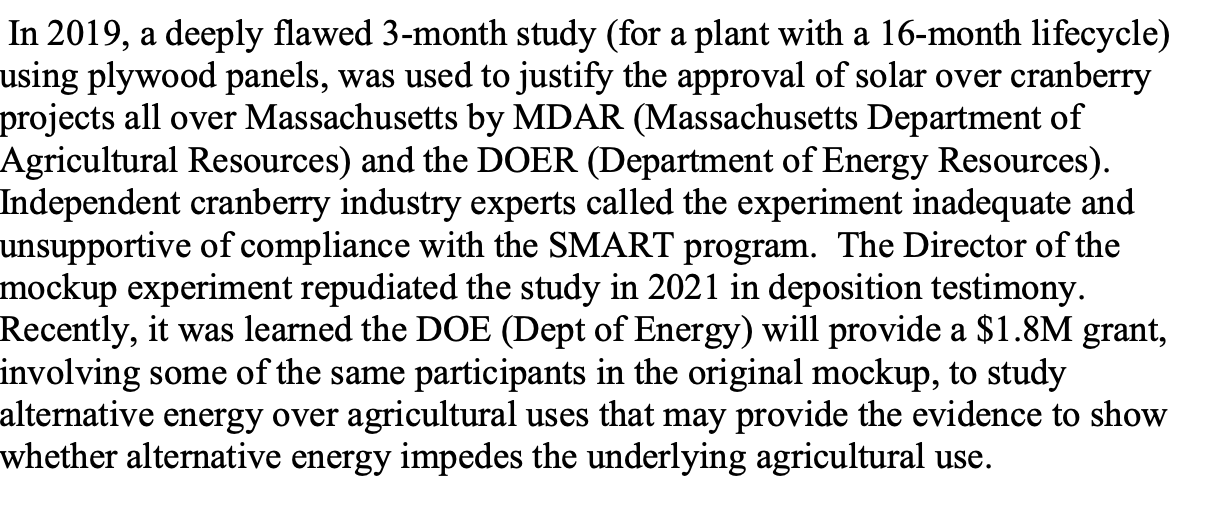Science does not support the claim that cranberries or other crops can grow under solar panels.
Why are we investing hundreds of millions of dollars on the dual use experiment?
Dual use solar is being rolled out in Massachusetts in a reckless way. Thousands of wood pilings treated with arsenic (copper chromated arsenic) are installed in wetland cranberry bogs and the drinking water aquifer for “dual use” projects approved by the Secretary of Energy & Environmental Affairs. Read about the PineGate Renewables and AD Makepeace arsenic pole crisis in Carver MA. Arsenic poles are also in place on Rochester MA at Bay State Agricultural’s bogs.

Even the leading cranberry industry spokesman from Carver MA admits this as of May, 2021: “There is a lot of thought going into how to do these things right,” said Iain Ward, a veteran cranberry farmer and solar consultant who will be operating the parcels in Carver for Pine Gate. “In five to six years, we’re going to have new best practices specifically tailored to growing crops under dual-use arrays.” Unproven results – but hundreds of millions of dollars of projects are being built in the state.
Massachusetts and other states are promoting industrial solar facilities on farm land claiming that using the land for “dual” purposes – making electricity and growing food — are compatible land uses. There is no proof of this – the cranberry industry and Blue Wave solar, one of the big corporations promoting this idea — all admit this is “experimental.”
Massachusetts “dual use” regulations are part of the so-called SMART solar program. DOER pre-approves dual use projects and then they are supposed to meet the agricultural conditions after they are built. Some DOER “ letters for dual use projects are here if you want to look for a project in your community.
It appears all solar over cranberry bogs were approved by DOER based on an inadequate and flawed 3 month study in Carver MA using plywood panels. UMass was involved in this so called study.
This flawed, backwards approach – approve the project, build it and see if crops will grow — has backfired in a big way in Carver MA. DOER approved three dual use projects valued at $55 million for cranberry bogs. The projects were approved using wood poles treated with copper chromated arsenic (CCA). When the public exposed this, DOER looked the other way and PineGate Renewables, facing liability and penalties, announced in November 2021 that it is removing and replacing the poles.
Taxpayer funds are being used to help private corporations justify these programs. DOER and the Massachusetts Department of Agriculture work together to funned money to UMass programs to provide research for the private solar companies like PineGate Renewables and REDP-the companies with toxic poles in Carver, MA.
The UMass Clean Energy Extension “was established with funds from the Department of Energy Resources” and works in partnership with DOER “to help it fulfill its mission and programmatic activities to promote clean energy.” https://ag.umass.edu/clean-energy/about/state-partner (accessed 11/8/2021) With taxpayer funding, UMass undertakes a wide range of activities to support privately owned solar companies, including studying how solar PV panels affect crop production under the panels.
The UMass Cranberry Station is using DOER funds conducting pilot projects and experiments to assist privately owned solar companies like PineGate Renewables, owner of the $53 million project in Carver putting toxic poles in cranberry bogs. The Cranberry Station is seeking a $1 million taxpayer grant to help the solar and cranberry industries justify “dual use” solar on cranberry bogs.
None of the cranberry bog projects that DOER has approved can show compliance with DOER’s SMART program without long term studies showing the agricultural use will not be negatively impacted under the panels. The DOE grant will take several years to show results. All solar over cranberry projects should be halted in MA
The batteries make the situation even worse.
Here’s what a Massachusetts resident whose family has been farming in Southeastern Massachusetts for 70 years expresses concern about dual use in October 2021 comments to the Massachusetts legislature. Writing about dual use on cranberry bogs, the resident writes:

Here’s what farmer Fred Beddall from Northampton, Mass. has to say about DOER’s dual use solar program:

On October 27, 2921, the Northampton (MA) Agricultural Commission issued a statement on “Dual Use Solar Development on Prime Agricultural Lands.” The Commission supports renewable energy but doesn’t think we need to “sacrifice our best agricultural land to meet our energy goals.” The Commission opposes the industry’s Senate Bill 590 seeking more subsidies for ground-mounted solar projects on farmland. Read the statement here.
https://www.njspotlight.com/2021/07/large-scale-solar-projects-threaten-nj-shrinking-farming-some-crops-might-flourish-but-major-limits/
